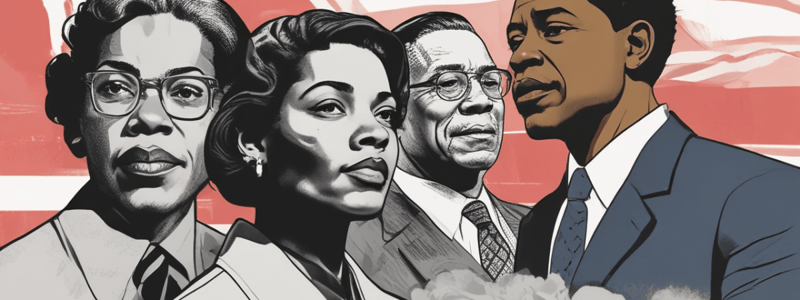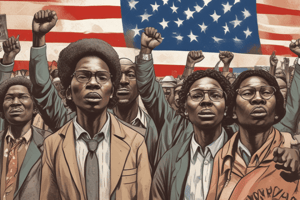Podcast
Questions and Answers
What is the primary goal of the struggle for civil rights?
What is the primary goal of the struggle for civil rights?
- To promote individual autonomy and self-expression
- To ensure equal treatment and protection under the law for all individuals (correct)
- To establish a democratic system of government
- To restrict the freedom of certain groups
What is a key feature of a democratic system of government?
What is a key feature of a democratic system of government?
- The restriction of voting rights to certain groups
- A monarch or dictator holding absolute power
- The suppression of freedom of speech and assembly
- Protection of individual rights and freedoms (correct)
What is the main difference between positive liberty and negative liberty?
What is the main difference between positive liberty and negative liberty?
- Positive liberty refers to freedom to pursue one's goals, while negative liberty refers to freedom from external constraints (correct)
- Positive liberty is only applicable in democratic systems, while negative liberty is applicable in all systems
- Positive liberty refers to freedom from external constraints, while negative liberty refers to freedom to pursue one's goals
- Positive liberty is essential for promoting equality, while negative liberty is essential for promoting individual autonomy
What is the significance of the Civil Rights Act of 1964?
What is the significance of the Civil Rights Act of 1964?
What is the relationship between freedom and equality?
What is the relationship between freedom and equality?
What is the purpose of representative government in a democratic system?
What is the purpose of representative government in a democratic system?
What is the significance of the Voting Rights Act of 1965?
What is the significance of the Voting Rights Act of 1965?
Why is the protection of individual freedoms essential for promoting equality?
Why is the protection of individual freedoms essential for promoting equality?
Flashcards are hidden until you start studying
Study Notes
Freedom and Equality
Civil Rights
- The struggle for civil rights aims to ensure equal treatment and protection under the law for all individuals, regardless of race, gender, religion, or other personal characteristics.
- Key milestones in the civil rights movement include:
- The Civil Rights Act of 1964, which prohibited discrimination based on race, color, religion, sex, or national origin.
- The Voting Rights Act of 1965, which protected the right to vote for African Americans.
- Civil rights are essential for promoting equality and combating discrimination.
Democracy
- Democracy is a system of government that upholds the principles of freedom and equality.
- Key features of democracy include:
- Representative government, where citizens elect representatives to make decisions on their behalf.
- Protection of individual rights and freedoms, such as freedom of speech and assembly.
- Equal access to the political process, including voting rights.
- Democracy provides a framework for citizens to participate in the decision-making process and hold leaders accountable.
Liberty
- Liberty refers to the freedom to make choices and live life as one desires, as long as it does not harm others.
- Types of liberty include:
- Positive liberty, which refers to the freedom to pursue one's goals and aspirations.
- Negative liberty, which refers to the freedom from external constraints or interference.
- Liberty is essential for promoting individual autonomy and self-expression.
Interconnection between Freedom and Equality
- Freedom and equality are intertwined concepts, as true freedom requires equal access to opportunities and resources.
- The pursuit of equality is essential for ensuring that all individuals have an equal chance to exercise their freedom.
- In turn, the protection of individual freedoms is necessary for promoting equality and combating discrimination.
Freedom and Equality
Civil Rights
- Civil rights aim to ensure equal treatment and protection under the law, regardless of race, gender, religion, or personal characteristics.
- The Civil Rights Act of 1964 prohibited discrimination based on race, color, religion, sex, or national origin.
- The Voting Rights Act of 1965 protected the right to vote for African Americans.
- Civil rights promote equality and combat discrimination.
Democracy
- Democracy is a system of government that upholds freedom and equality principles.
- Representative government allows citizens to elect representatives to make decisions on their behalf.
- Democracy protects individual rights and freedoms, such as freedom of speech and assembly.
- Equal access to the political process, including voting rights, is a cornerstone of democracy.
Liberty
- Liberty is the freedom to make choices and live life as desired, without harming others.
- Positive liberty refers to the freedom to pursue goals and aspirations.
- Negative liberty refers to the freedom from external constraints or interference.
- Liberty promotes individual autonomy and self-expression.
Interconnection between Freedom and Equality
- True freedom requires equal access to opportunities and resources.
- Pursuing equality ensures all individuals have an equal chance to exercise their freedom.
- Protecting individual freedoms is necessary for promoting equality and combating discrimination.
Studying That Suits You
Use AI to generate personalized quizzes and flashcards to suit your learning preferences.




